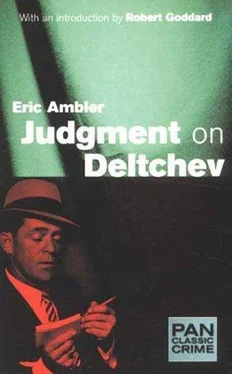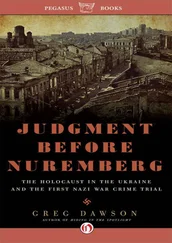Eric Ambler - Judgment on Deltchev
Здесь есть возможность читать онлайн «Eric Ambler - Judgment on Deltchev» весь текст электронной книги совершенно бесплатно (целиком полную версию без сокращений). В некоторых случаях можно слушать аудио, скачать через торрент в формате fb2 и присутствует краткое содержание. Год выпуска: 1977, ISBN: 1977, Издательство: Vintage, Жанр: Криминальный детектив, на английском языке. Описание произведения, (предисловие) а так же отзывы посетителей доступны на портале библиотеки ЛибКат.
- Название:Judgment on Deltchev
- Автор:
- Издательство:Vintage
- Жанр:
- Год:1977
- ISBN:9780307049971
- Рейтинг книги:4 / 5. Голосов: 1
-
Избранное:Добавить в избранное
- Отзывы:
-
Ваша оценка:
- 80
- 1
- 2
- 3
- 4
- 5
Judgment on Deltchev: краткое содержание, описание и аннотация
Предлагаем к чтению аннотацию, описание, краткое содержание или предисловие (зависит от того, что написал сам автор книги «Judgment on Deltchev»). Если вы не нашли необходимую информацию о книге — напишите в комментариях, мы постараемся отыскать её.
Judgment on Deltchev — читать онлайн бесплатно полную книгу (весь текст) целиком
Ниже представлен текст книги, разбитый по страницам. Система сохранения места последней прочитанной страницы, позволяет с удобством читать онлайн бесплатно книгу «Judgment on Deltchev», без необходимости каждый раз заново искать на чём Вы остановились. Поставьте закладку, и сможете в любой момент перейти на страницу, на которой закончили чтение.
Интервал:
Закладка:
‘Herr Valmo ?’ I said.
He smiled. ‘I am afraid a little explanation is due to you, mein Herr .’ He had a quiet, monotonous voice.
‘It was not possible for me to explain, Herr Foster,’ said Pashik. ‘I could not break a confidence.’
‘Please sit down, Herr Foster, and you, my dear Pashik. A cigarette? Ah, you are already smoking. As our friend Pashik explained to you, I am, you might say, some sort of a policeman, a very’ — he made a belittling gesture with his hand — ‘a very confidential sort of policeman.’ The woman appeared at the door with a tray and he glanced round. ‘Yes, come in, Mentcha. Put it down.’ He turned again, pulled round a chair, and sat facing me. ‘Coffee and a little brandy, Herr Foster. You have had a very upsetting experience, our friend tells me. Thank you, Mentcha. Shut the door. And now,’ he went on as she went out, ‘we must set your mind at rest. In the coffee, the brandy?’
‘Thank you.’
Pashik was sitting deferentially by as if at a conference between his superiors. The hand holding his cigarette was trembling slightly.
Valmo handed me a cup and went on talking as he filled the other two. ‘There is one thing,’ he said, ‘that I must ask of you, Herr Foster. That is that you respect the confidence of what I am about to tell you.’ He held a cup out to Pashik but he looked at me. ‘Pashik tells me that you are not friendly to the regime here. I understand. But I am not a politician. I am a civil servant. Our country is a centre for many conspiracies against the law and it is my task to destroy them. Can I be certain that you will respect my confidence, Herr Foster?’
‘Yes.’ I tasted the coffee.
‘Very well.’ He put his cup behind him on the table and then leaned forward toward me with his elbows on his knees and his hands together. ‘In my role of policeman, Herr Foster, it was my duty to seek out the perpetrators of the bomb outrage against Herr Deltchev which took place shortly before his arrest. I made certain secret enquiries and investigations. It was believed that the criminals had had the Deltchev family under surveillance, and members of the family co-operated with me in identifying them. I have said that my function is not political. Herr Deltchev’s trial does not relieve me of the responsibility of tracing these criminals. You understand?’
I nodded.
‘For reasons with which I will not trouble you,’ he continued, ‘it became necessary for me to install an agent in the Patriarch Dimo. For convenience and identification, the agent employed my name. Very well. Three days ago my agent reported to me that he had news of the men we were after. That night he was killed.’ He paused impressively.
‘Who found him dead?’ I asked.
He stared at me for a moment. Then he turned round and picked up his coffee cup again. ‘I did, Herr Foster,’ he said blandly. ‘However, let me continue. The agent had collected certain documentary evidence against the conspirators, which he kept hidden in the room. I discovered that this had not been stolen. Therefore, I argued, they did not know of its existence. Therefore, if they were made aware of its existence they would return for it. Therefore I replaced the true documents with some false ones that I prepared and sat down to wait for results.’
‘You mean you put a secret watch on the house to catch the murderer when he returned?’
He smiled gently and shook his head. ‘I am afraid you do not know the street of the Patriarch Dimo, Herr Foster,’ he said. ‘That sort of secret could not be kept there. No. I set a different kind of trap. All I wanted was to get the false documents into the conspirators’ hands. I had reason to believe that in fact that had happened. Tonight I asked Herr Pashik, who is a friend of mine and also sometimes a helper, to go to the house and make sure.’ He spread his hands out like a conjuror. ‘He finds you there.’
‘With a letter addressed to you.’
‘Exactly. Katerina Deltchev had recalled an important piece of evidence. She wrote to tell me of it.’
‘Through your agent.’
‘Naturally. This address is most confidential, Herr Foster. So you see how it has happened and the need for your discretion.’ He sat back with a smile, clicked his lighter, and held the letter in the flame of it. As it caught fire, he smiled at me again. ‘I’m sure you do,’ he added.
I thought quickly. It was just not quite good enough. The man who called himself Valmo and said that he was of the secret police had had a certain initial advantage; he did not look like the conventional secret policemen of fiction. If he had been vaguer and more mysterious about his story, it might even have been convincing. There would have been nothing unlikely about a secret policeman who was secretive. But this man had seen the holes in his story as he was telling it and instead of leaving them had tried to cover them up. For instance, having indicated an official connection between the Deltchev household and Patriarch Dimo Street he had decided that it did not satisfactorily cover Katerina’s letter, so he had added another detail: that weak one about her recalling an important piece of evidence. It would have been better to let me see the hole and question it. He could then have replied with a knowing shake of the head that he was afraid he could not permit himself to give me that information. And that, in turn, would have prevented my asking the awkward question I did in fact ask.
‘Herr Valmo,’ I said, ‘what I don’t understand is why Fräulein Deltchev, who is under house arrest, has to get me to smuggle out a letter to the head of the secret police. Why didn’t she just give it to one of the sentries?’
He crushed the ashes of the letter onto the tray. ‘She is a girl. No doubt she was afraid I would not get it.’
‘She seemed more concerned about the censorship than anything else. She made me promise to deliver it by hand.’
‘Confinement affects some people strangely.’
‘Shall you go to see her?’
‘It may be necessary. I do not know.’ He was getting confused now. He pulled himself together a trifle impatiently. ‘Those, however, are not matters of immediate concern, Herr Foster. It is your position that we must make clear.’
‘Yes?’
‘I have given you a great deal of confidential information. It must, please, remain confidential.’ His pale eyes stared at me coldly. ‘I may add, Herr Foster, that if you were not a distinguished journalist, it would have been considered advisable to put you in prison for a short while to make sure of your behaviour. That, however, we need not discuss. You have already assured me that you will be discreet. I require now three further undertakings from you. Firstly’ — he held up a finger — ‘that you will not return to the house in the Patriarch Dimo or tell anyone of it. Secondly, that you will not again visit the Deltchev house. Thirdly, that you will make no attempt to identify this house and that you forget its existence, and mine.’
I did not reply immediately. I knew now the kind of conversation that must have taken place between Valmo and Pashik while I was safely locked up and waiting. My one desire was to get out of the place as quickly as possible. But I had the sense to realize that if I showed my anxiety and agreed to the terms too hastily, they would not feel quite safe. They were both watching me narrowly. I frowned, then looked up and nodded.
‘All right,’ I said curtly. ‘I agree. And now, if you don’t mind, I’d like another brandy.’
Valmo stood up. ‘Yes, of course,’ he said perfunctorily. He poured a small one. He could not wait to get rid of me now. ‘Herr Pashik?’
‘Thank you, no.’
They stood looking at me impatiently while I sipped the brandy. It was the only moment of enjoyment I had had in the whole evening and it lasted about ten seconds. As I swallowed the first sip, I heard the front door of the apartment open and close and footsteps in the passage outside.
Читать дальшеИнтервал:
Закладка:
Похожие книги на «Judgment on Deltchev»
Представляем Вашему вниманию похожие книги на «Judgment on Deltchev» списком для выбора. Мы отобрали схожую по названию и смыслу литературу в надежде предоставить читателям больше вариантов отыскать новые, интересные, ещё непрочитанные произведения.
Обсуждение, отзывы о книге «Judgment on Deltchev» и просто собственные мнения читателей. Оставьте ваши комментарии, напишите, что Вы думаете о произведении, его смысле или главных героях. Укажите что конкретно понравилось, а что нет, и почему Вы так считаете.












